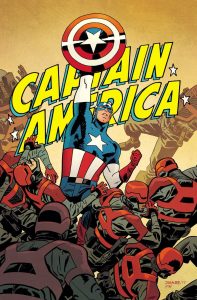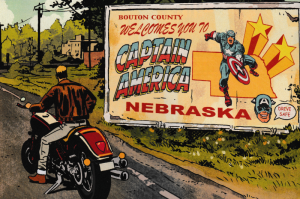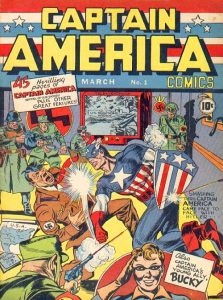 My son Ethan handed me this and said, “You need to read this.” It explains and excuses, he told me, the faults of the recent “event” which unjustifiably stole the name Secret Empire. It brings back Captain America, the real Cap, not the Hydra agent who everyone should have realized was simply a story device. They didn’t realize it. They got all bent out of shape by it, and suggested that Marvel’s creative teams had actually become Nazis. It seems comics fans have become less sophisticated over the years.
My son Ethan handed me this and said, “You need to read this.” It explains and excuses, he told me, the faults of the recent “event” which unjustifiably stole the name Secret Empire. It brings back Captain America, the real Cap, not the Hydra agent who everyone should have realized was simply a story device. They didn’t realize it. They got all bent out of shape by it, and suggested that Marvel’s creative teams had actually become Nazis. It seems comics fans have become less sophisticated over the years.
It’s kinda funny, 72 years after their defeat, that we Americans are still seeing Nazis under every bed, with as much fear and paranoia as Joe McCarthy ever brought to his quest for Communists. And, to be fair, there were card-carrying members of the Communist Party in the movie industry, and the much-lauded Dalton Trumbo actually was using his position to propagandize his views. But later generations judged McCarthy’s actions to be extreme. So, when there are no members of the Nazi party in any position of power in our country now, just people who are to the political right of whoever is slinging the term “Nazi” at them, I wonder how future generations will view our current behavior.
 That state of affairs is the reason for the only thing that annoyed me about this issue. There’s a celebration on Cap’s behalf, you see, in a little town in Nebraska that’s so grateful for the time he saved them from terrorists that they voted to name themselves, “Captain America, Nebraska.” As part of the festivities, attendees stand up on stage and say why they love Captain America. This ranges from a firefighter relaying the tale of being saved by Cap from a fire as a child, to a young man gushing that Cap is “crazy handsome,” to a grandmother saying that, when Cap speaks, she feels hope. All good.
That state of affairs is the reason for the only thing that annoyed me about this issue. There’s a celebration on Cap’s behalf, you see, in a little town in Nebraska that’s so grateful for the time he saved them from terrorists that they voted to name themselves, “Captain America, Nebraska.” As part of the festivities, attendees stand up on stage and say why they love Captain America. This ranges from a firefighter relaying the tale of being saved by Cap from a fire as a child, to a young man gushing that Cap is “crazy handsome,” to a grandmother saying that, when Cap speaks, she feels hope. All good.
 But the guy who, leering like a doofus, says “He punches Nazis!” rubbed me the wrong way. And maybe it shouldn’t have. I mean, one of the most iconic images of Cap for comics fans whose knowledge of the genre encompasses his entire career is a World War II era cover depicting him punching Adolph Hitler himself. So this scene might be no more than a reference to that famous image. Unfortunately, in 2017, “Nazi-punching” has taken on a different connotation altogether. On social media, it’s come to mean that it might be okay to punch someone because of their political beliefs, that some beliefs might just be so toxic that it’s okay to punch first and ask questions later, or not ask questions at all.
But the guy who, leering like a doofus, says “He punches Nazis!” rubbed me the wrong way. And maybe it shouldn’t have. I mean, one of the most iconic images of Cap for comics fans whose knowledge of the genre encompasses his entire career is a World War II era cover depicting him punching Adolph Hitler himself. So this scene might be no more than a reference to that famous image. Unfortunately, in 2017, “Nazi-punching” has taken on a different connotation altogether. On social media, it’s come to mean that it might be okay to punch someone because of their political beliefs, that some beliefs might just be so toxic that it’s okay to punch first and ask questions later, or not ask questions at all.
That makes me uncomfortable because, well, Cap did punch Nazis, but he punched them back in the days when the Nazis had damn well punched first. And Captain America, for me, is a guy who would only use violence to counter existing violence. Not potential violence. Not advocated violence. Not a political philosophy that he was afraid might lead to violence.
In the text page at the end of the story, writer Mark Waid reveals his lifelong love of Captain America, what the character means to him, and why Cap stands out, for him, from other Marvel characters. He also asks readers to share what Cap means to them. That request reminded me that, when I was 15, I started writing an Avengers story, in prose. That was around the time that Marvel was publishing a series of novels and novellas, written by some of their top talents. I was inspired by them. I never finished that Avengers story. Don’t even remember what it was about. I didn’t even finish the first scene, in which someone—either Hawkeye or the Scarlet Witch—was awakened out of a sound sleep to attend an emergency meeting. I then introduced each of the characters with a physical description and some character notes. I remember what I wrote about Cap. It was 1980, and Ronald Reagan was running for President. A wave of conservatism was sweeping the country, overtaking the liberalism of Norman Lear and Alan Alda, my personal heroes at the time. I didn’t like that change. I was very uncomfortable, therefore, with overt displays of patriotism, because I associated them with the excesses of the right wing and the Moral Majority. So I told my (non-existent) readers that, for many, Cap didn’t stand for any particular elected official or political party, but rather for the ideals that represented the best of America. For me, those ideals were compassion, freedom of speech and religion, and sexual and racial equality. (And those still are my American ideals, even though I’m no longer a liberal.)
And, despite the couple of panels depicting a grinning idiot who made me uncomfortable, because I don’t like Antifa any better than I like neo-Nazis, Mark Waid’s latest interpretation of Captain America brings to life exactly what Cap is for me. A great issue, and a promising start for Cap’s newest series.
